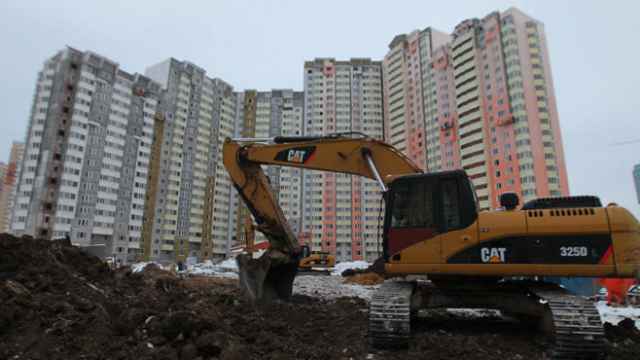Russia's biggest privately-held homebuilder, SU-155, said it had failed to pay out to its bondholders under a put option agreement and was seeking to restructure its debts to avoid an outright default.
Many Russian developers have borrowed heavily to fund construction in recent years to meet booming demand for new apartments from a growing middle class, but are now facing problems after the ruble slumped and the cost of mortgages skyrocketed.
Global investors have been closely watching developments in Russia, whose economy is teetering on the brink of recession due to a steep fall in oil prices and Western sanctions over Moscow's role in Ukraine. Some of them are fearing of a wave of corporate defaults due to the crisis.
SU-155, which builds budget housing in Moscow, St. Petersburg and other cities mostly in central Russia, said it would not meet its obligations on Series 5, 6 and 7 bonds .
Bondholders had tendered more than 2.3 billion rubles ($37 million) of the bonds before a Feb. 24 deadline for their repurchase under a put option agreement, and the company will be officially in default if it fails to pay out within 10 working days of the March 3 put date.
SU-155 blamed malpractice by participants of repo deals with its bonds although data from the Moscow Exchange showed only 20 percent of the tendered bonds were affected by the non-fulfilment of repo deals.
"Imprudently risky operations by SU-155's financial partners and the non-fulfilment of their obligations in repo deals, as well as the current unfavorable economic situation ... provoked force majeure for SU-155 which does not allow ... to fulfil its commitments to repurchase bonds in proper time," it said in a statement.
The firm, a major supplier of housing for Russia's army, said it was considering various restructuring options.
The developer's debt troubles come after airline UTair failed to repurchase 2.7 billion rubles of its bonds in November and proposed restructuring.
A Message from The Moscow Times:
Dear readers,
We are facing unprecedented challenges. Russia's Prosecutor General's Office has designated The Moscow Times as an "undesirable" organization, criminalizing our work and putting our staff at risk of prosecution. This follows our earlier unjust labeling as a "foreign agent."
These actions are direct attempts to silence independent journalism in Russia. The authorities claim our work "discredits the decisions of the Russian leadership." We see things differently: we strive to provide accurate, unbiased reporting on Russia.
We, the journalists of The Moscow Times, refuse to be silenced. But to continue our work, we need your help.
Your support, no matter how small, makes a world of difference. If you can, please support us monthly starting from just $2. It's quick to set up, and every contribution makes a significant impact.
By supporting The Moscow Times, you're defending open, independent journalism in the face of repression. Thank you for standing with us.
Remind me later.





